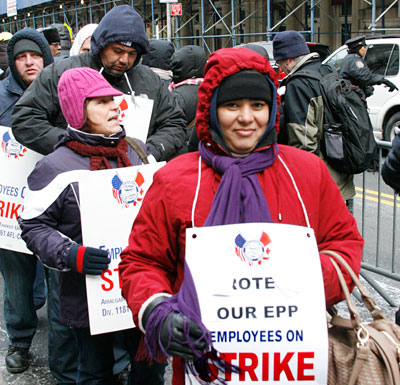(front page)
NYC school bus workers
stand up to union busting
‘Our wages, benefits, jobs are at stake’

|
|
Militant/Seth Galinsky
|
| Jan. 22 picket line at New York City Board of Education by striking school bus workers.
|
BY SETH GALINSKY
NEW YORK—“We’re not out here because we want a raise, it’s for job security,” striking school bus driver Gladston McAlmon said while helping to organize the picket line at the bus depot near JFK airport Jan 22. “If they take away the Employee Protection Provisions, we would lose everything, our wages, our benefits, our jobs.”
Some 8,800 school bus drivers, attendants (often called matrons), and mechanics who belong to Amalgamated Transit Union Local 1181 went on strike Jan. 16 after city and school officials declared the protection provisions are now “illegal” and can’t be part of future contracts the city has with private bus companies. Instead of hiring workers directly, the New York City government contracts private companies to bid on routes. At least 1,100 routes, including those for students with special needs, are up for bid this year.
“Under the Employee Protection Provisions, if the company we work for goes out of business or loses a bid, we follow the work. The company that wins the bid has to hire us by seniority off the master pick list,” explained driver Laura Angelo, while picketing at the Board of Education. “It has happened to me two or three times. I kept my pay scale, my seniority and my benefits.”
A propaganda barrage by Mayor Michael Bloomberg, Schools Chancellor Dennis Walcott and the local media have painted the strikers and their union as holding students who depend on school bus transport hostage out of selfishness and greed.
School bus drivers start out at $14 an hour. After six years they reach the top pay of under $30 an hour. Attendants start out at $11 an hour and top out at $15.31.
“We get no paid sick days,” Angelo said. “We only work 40 weeks a year. The other 12 weeks we collect unemployment, which is less than half your salary. We often work 10 hours but only get paid for eight because our two hour ‘layover’ is unpaid.”
“This strike is about job guarantees that the union just can’t have,” Bloomberg stated Jan. 16, claiming that a court decision in June 2011 banned the protection provisions. The mayor accused union officials of lying when they point out that the court decision does not apply to the current dispute.
A version of the protection provisions was first won after a 20-day strike in April 1965. A three-month strike in spring 1979 broadened the protection. “The Employee Protection Provisions we have today have essentially been in place since then,” ATU Local 1181 spokesperson Maggie McKeon said in a phone interview. “It covers union and nonunion workers alike.”
“If it’s illegal, how come the city did it for all those years?” asked Joe Calceterra, a striker on the picket line. “It’s only illegal because Bloomberg wants it to be illegal.”
Bus company owners seek injunc-tion
New York School Bus Contractors Coalition Inc. has filed a complaint with the National Labor Relations Board asking for an injunction against the strike. Bus company bosses claim that the strike is a “secondary boycott” because the dispute is between the union and the city government. The coalition did not answer requests for comment.
Even though the board ruled last year that the union had the right to threaten to strike over the same protections, the board will grant a hearing this time because it’s an actual strike, NLRB Region 29 Director James Paulsen said in a phone interview. Charges of a secondary boycott are a priority rush and will receive a hearing soon, he said.
“The city says they can’t guarantee our wages because they don’t hire us, the private companies do,” said attendant Estelle Jacobs. “Then they say we don’t have the right to strike as if we were essential government workers.”
In a Jan. 18 column about the strike published in the New York Post titled “A Taste of the Future,” John Podhoretz, a conservative commentator, summed up what the propertied rulers are preparing for.
“Over the next decade, cities and states across America will be compelled to tighten their belts as the really big bills—the pension bills they cannot afford—come due,” Podhoretz wrote. “They’ll have to go after existing contracts with current workers.
“And what recourse will those workers have, if the situation turns so dire that they can no longer depend on the ministrations of politicians who crave their votes?
“They will disrupt. They will impede. They will seek to create civil chaos. Welcome to the future.”
Union solidarity
The strikers have received solidarity from other unions, including the Transport Workers Union, United Food and Commercial Workers, New York State Nurses Association and the Central Labor Council, all of which have encouraged their members to walk the picket lines. Officials of Teamsters Local 854, which organizes about 1,000 school bus workers, say they are not on strike, but their members are honoring the picket lines.
According to the Department of Education, only 2,320 out of 7,700 bus routes are operating, either by nonunion companies or members of United Craft and Industrial Workers Union Local 91, which organizes some workers at Logan Bus Co. Officials from Local 91 did not return calls requesting comment.
“They’d like to pay us minimum wage. They want to get rid of the matrons. They want to bust the union,” striking bus driver Joe Balducci told the Militant. “If we don’t strike we’ll go backwards.”
Related articles:
On the Picket Line
Canada gov’t targets unions with financial disclosure law
Long-term joblessness remains at record high
|



